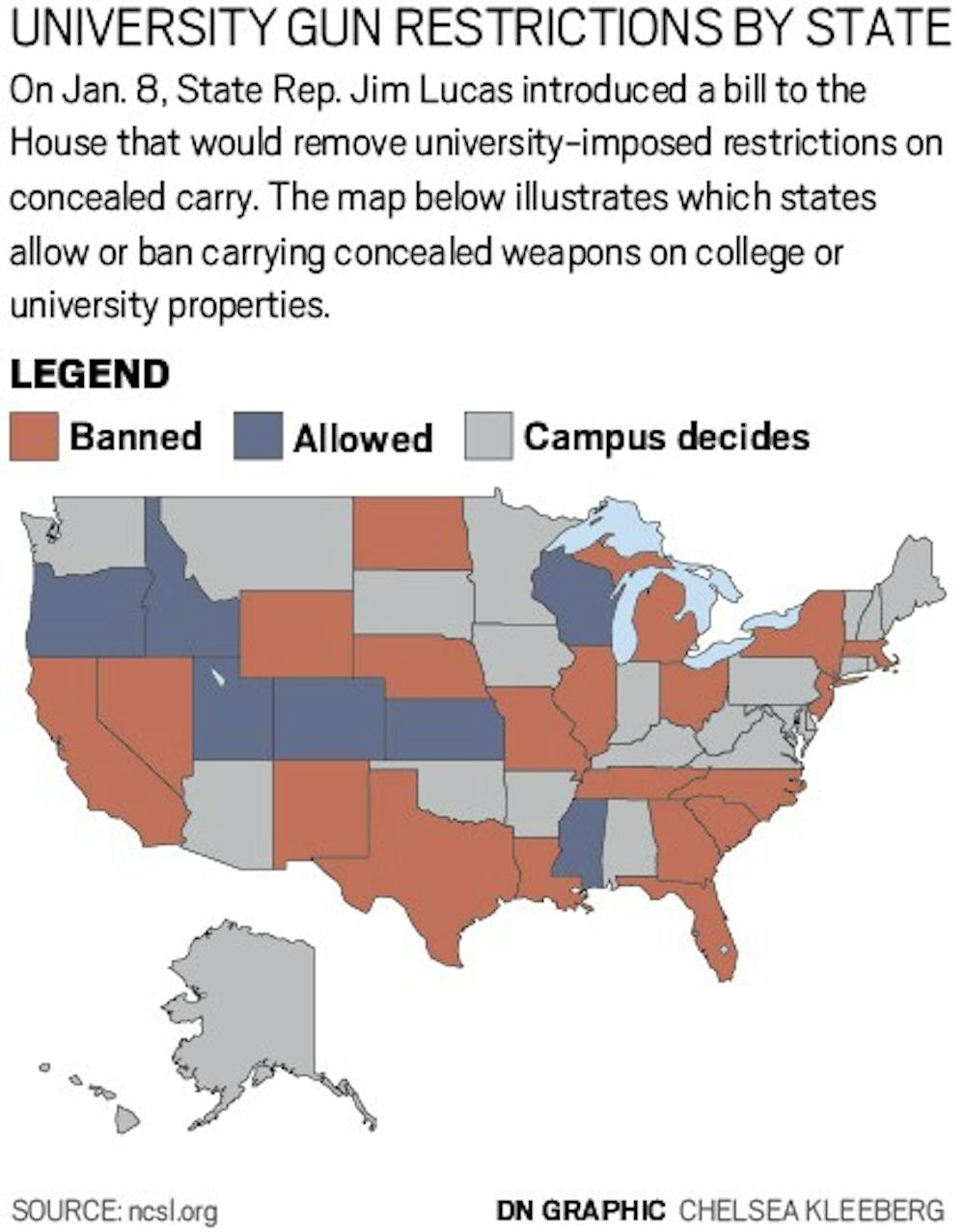Seven states allow concealed carry on campuses:
Colorado, Idaho, Kansas, Mississippi, Oregon, Utah, and Wisconsin
In 23 states the decision to ban or allow concealed carry weapons on campuses is made by each college or university individually: Alabama, Alaska, Arizona, Arkansas, Connecticut, Delaware, Hawaii, Indiana, Iowa, Kentucky, Maine, Maryland, Minnesota, Montana, New Hampshire, Oklahoma, Pennsylvania, Rhode Island, South Dakota, Vermont, Virginia, Washington, and West Virginia.
All other states ban concealed carry.
Source: National Conference of State Legislatures http://www.ncsl.org/research/education/guns-on-campus-overview.aspx
Stats from Kubchandani’s 2013 research on student opinions on concealed carry:
- About 16 percent of undergraduate students own a firearm and 20 percent witnessed a crime on their campus that involved firearms.
- About 79 percent of students would not feel safe if faculty, students, and visitors carried concealed handguns on campus.
- About 66 percent did not feel that carrying a gun would make them less likely to be troubled by others.
- Half did not know whether their university had a policy regarding firearms on campus.
- Most students also believed that allowing concealed carry guns would increase the rate of fatal suicides and homicides on campus.
Source: bsu.edu
The students building a grassroots advocacy group for concealed carry rights on Ball State’s campus defy expectations--they don’t even use the word “gun.”
“It’s tied into gun violence,“ their president David Vest said. “We normally use firearm or side arm.”
The four members of the executive board for Students for Concealed Carry are half men and women, varied ethnicities and come from majors like criminal justice, psychology and social work. The group does not affiliate with any political party.
“[When people imagine Students for Conceal Carry] they picture Larry the Cable guy, drinking a beer with a rebel flag and a shotgun and that’s not what we are,” Vest said. “I just want to make a non-politically biased movement just for what we are talking about and have no other spin or twist on it.”
Vest is a junior psychology major in the U.S. army reserve. He’s also engaged to the group’s treasurer, Chyna Spencer.
He’s working on restarting the student organization Students for Concealed Carry that has been attempted and failed at different times in the past.
This time, he said, all the members of the executive board will be on campus next year to continue the organization, and they are in the process of being recognized by the Office of Student Life. The membership base right now is small, around 15 people, but they add two or three members each week to their Facebook page and they haven’t even met formally yet.
They say they just want to be able to protect themselves and others if something bad happens. They want veterans to be able to have concealed carry so they feel safe.
“From a social work perspective,” Spencer said, “it might be culturally inappropriate to not allow somebody who has been in combat to carry a sidearm because these individuals are risking their sense of safety when they are on campus, when they are not allowed to carry.”
As this organization reforms on campus, State Rep. Jim Lucas introduced House Bill 1143 on Jan. 8, which would achieve the same ends by prohibiting universities from putting restrictions on concealed carry. The bill was sent to a committee on public policy.
Similar bills were also introduced in 2012, 2013 and 2014. All bills died without a hearing.
Indiana’s current law lets colleges and universities decide for themselves whether or not to allow concealed carry.
Ball State’s weapon’s policy in the Student Code mandates all individuals are prohibited from carrying weapons while on campus “whether they are licensed to carry the weapon or not.”
No college or university in Indiana allows for concealed carry.
While lawmakers may try the approach every year, and Students for Concealed Carry gather some support, studies done by a Ball State faculty member point that popular opinion is against concealed carry on campuses.
Community health education professor Jagdish Kubchandani’s research has found that a majority of university presidents, police chiefs and students in the midwest do not want concealed carry on their campuses.

A majority of students, 78 percent, do not want conceal carry, along with 95 percent of university presidents. Of police chiefs, 86 percent do not think that allowing students concealed carry on campuses would prevent some or all campus killings.
The research comes from three separate studies collected in the Midwest from 2009 to 2013.
Kubchandani said lawmakers should consider the opinions of those who are directly affected by a policy.
“When a policy is self-imposed, grassroots, it is more effective because people want that change,” he said. “In this case what is happening is top-down.”
Grassroots policy change is exactly what Students for Concealed Carry hope to bring about.
At the end of March, they will participate in an empty holster protest. A local gun retailer has volunteered to donate empty holsters for students who do not have one, to wear and raise awareness about the rules against conceal carry.
“[We are] showing people how we are allowed to protect ourselves in a university setting right now, which is nothing but what we have on us,” Vest said. “It’s the school that's trying to prevent us. It’s not the government, it’s not the state, it’s not the nation. It’s just Ball State and the other schools are the ones preventing us from being able to protect ourselves.”
Kubchandani said that those who are not the majority, like Students for Concealed Carry, should still be listened to because they may have valid points to disagree with the general opinion.
“There are 22,000 students here and if they demand [concealed carry], they should get it,” he said. “But given the polls, I don’t think it is highly likely.”





